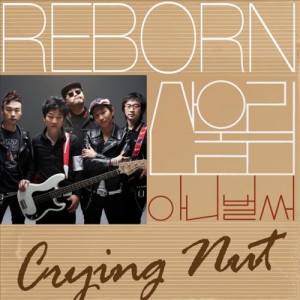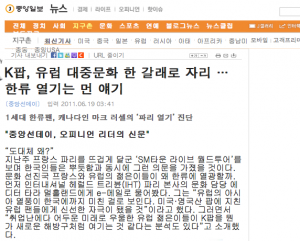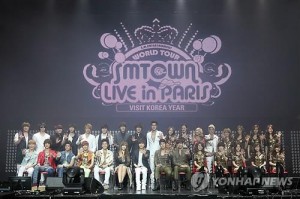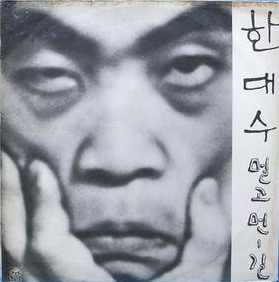With the 35th anniversary of Sanullim coming up next year, JR Media says it is coming out with two albums of Sanullim covers and mixes to celebrate. Called “Sanullim Reborn,” the first album will come out in November, and a second one next year. Among the bands included will be Crying Nut, Lee Juck, and Ali.
Category: South Korea (Page 9 of 13)
UPDATE: The LA Times movie blog has more about Cohen’s plans and the movie here.
* * *
ORIGINAL POST:
Wow, some ambitious plans coming from CJ E&M Pictures (until recently CJ Entertainment) — they have tapped Rob Cohen, director of FAST AND THE FURIOUS, to helm a 1950, a $100-million movie about the Korean War. That’s rather impressive.
Most importantly, the story looks pretty interesting, too, based on the life of the famous New York Herald Tribune journalist Marguerite Higgins. After reporting on WWII, Higgins was sent to Tokyo in the late 1940s. So when the Korean War started, she flew over right away to cover the fall of Seoul. Soon after that, the Tribune’s star war reporter (Homer Bigart) arrived to cover the war and tried to send Higgins back to Japan, but she refused to go, and the two competed for stories. Then McArthur tried to ban women from reporting on the front lines, but she changed his mind. She would write WAR IN KOREA in 1951 and won a Pulitzer Prize.
Higgins died in 1966 when she was just 45 years old, covering the war in Vietnam.
The Film Biz Asia story says they are looking for a big Hollywood name to play Higgins and the marine platoon leader, and a major Korean actor will play a KATUSA (Korean soldier assigned to the US Army).
The film will end with the famous Christmas Eve evacuation of 100,000 Korean civilians from the Port of Hungnam in northern Korea, as North Korean and Chinese troops were moving in. This is quite an interesting place to end, as for years Cineclick Asia was trying to make a $20-million movie about that battle, called CHRISTMAS CARGO. At one point they had Terence Chang on board to produce and Bruce Beresford to direct, but I guess that project fell apart (as so many do).
At long last, it looks like a music company is coming out with a (legitimate) CD compilation for Shin Joong-hyun. Light in the Attic Records is presenting Beautiful Rivers And Mountains: The Psychedelic Rock Sound Of South Korea’s Shin Joong Hyun 1958-74, apparently coming out on Sept. 24. But 14 songs with big liner notes, it looks like a real winner.
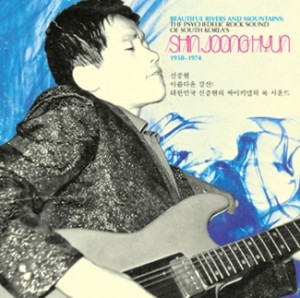
I’m just curious about the quality of the recordings on this. Most of the CDs issued of Shin’s music (and the other music on that period) have been terribly remastered, with low sound quality and often at the wrong speed. Even the big 10-CD Shin Joong-hyun Anthology boxset was rather substandard.
Although I must say, the presence of my Wall Street Journal article in the center of the liner notes to Shin’s Anthology is probably one of the proudest parts of my quasi-journalism career.
DJ Soulscape has apparently started blogging in English, contributing to the Egotripland website. There are only a few posts so far, but articles include Soulscape’s new record store (in the same building as his studio in Seoul) and Kim Wan Sun performing live in 1987 (which I do believe Matt at Gusts of Popular Feeling has posted before, but it is still good).
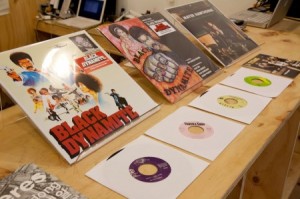
– Kim Kiduk is pissed off. Again. This time, he sent out a press release for POONGSAN (which he wrote and produced), complaining about how hard it is for different kinds of films to get screens in Korea, which tend to be dominated by blockbusters (sorry, no link… but I have been looking for one).
Which is true enough … although I notice that this sort of rant rarely talks about the responsibility a filmmaker has to audiences, to make something they might want to see. Or the responsibility of audiences to see non-blockbusters. If there were hordes of people pushing to get into indie films, which were being forced out of theaters while still doing good business, then I would be much more sympathetic. But if a theater owner can make X dollars with an indie film, and 10X with a blockbuster, why should the owner take a loss? Just to make Kim Kiduk and other self-important artistes feel better? That’s culture?
Ezra Pound had a great quote:
Music begins to atrophy when it departs too far from the dance… poetry begins to atrophy when it gets too far from music
And I think there is a similar delicacy to movies. They atrophy when they get too far from the dance. They might be a slow dance, a tango, a Lindy Hop or a late-night techno crunk, but they still dance.
(Of course, everything atrophies when it gets too close to money, so the opposite is not great either).
– Anyhow, I think my point is, if people are not enjoying the art you think they should, maybe you should do something about it, rather than just complain. Get aggressive with social media and personal marketing. If audiences don’t “get” your film, engage and work with them, help show them what there is to get.
Or turn to writing or comics (much cheaper than making movies). But if you want to spend millions of dollars to tell a story and it is not your money, don’t be surprised if people get all money-minded.
I also hate it when indie musicians complain about not being well supported in Korea, but then do precious little to make the scene better. They sit around complaining about how everyone else is failing, but do not take charge of their own lives and careers. Happily, though, that is beginning to change, and I think a lot of bands are being a lot more active about promoting themselves, getting better, and building the scene.
– After being out about a month, TRANSFORMERS 3: DAFT SIDE OF THE LOON looks like it is following the last two Transformers movies, making oodles of money at the box office in Korea. TRANSFORMERS was the top foreign film ever in Korea when it came out, with 7.3 million admissions. TRANSFORMERS 2 did slightly better with 7.4 million. And now, TRANSFORMERS 3 has 6.9 million admissions and is still going strong (637,000 admissions last weekend). So I think it has a very good chance of overtaking both of its predecessors.
(Of course, AVATAR kicked everyone’s butts last year, topping 13 million admissions and becoming the biggest film ever in Korea).
– HARRY POTTER AND THE DEATHLY HALLOWS: PART 2 did okay in Korea, in its debut weekend, with 1.7 million admissions — okay, but not great. But whenever a HARRY POTTER film comes out, I always remember what it was like when the first one was released. I was working at the JoongAng Ilbo at the time, and when a reporter asked about the title, I thought it best to go with the story’s original title: HARRY POTTER AND THE PHILOSOPHER’S STONE. Turns out Warner Bros. hated that (they wanted the American dummy title, THE SORCERER’S STONE), and yelled at the reporter. A lot.
HARRY POTTER AND THE CHAMBER OF SECRETS was really huge, but standards have really changed since then. It opened on 295 screens, about a third of all the screens in Korea then — today, there are around 2,000 screens, and big openings can get up to 900 screens. CHAMBER OF SECRETS was the biggest opening weekend Korea had ever seen then … with 1 million admissions. Today, plenty of films have opened to over 2 million.
The first two Potter films had around 4 million admissions (if I recall correctly), but since then, the others have been in the 2-3 million admission range.
– I’m pretty ambivalent about DEATHLY HALLOWS: PART 2, for what it’s worth. Yes, I was one of the lemmings that saw it opening weekend. It was definitely the most action-filled of the Potter films. And the CGI was really impressive — at times, even beautiful. The contrast between it and the first couple of Potter films is incredible (with their second-rate effects, bad child actors and really dull direction). But despite all its good points, I can barely remember DEATHLY HALLOWS 2. And at its core, HP is yet another “chosen one”, might-makes-right superhero story, far more American than British (despite the public school trappings). And it makes me want to re-read the original BOOKS OF MAGIC miniseries.
– The Korean film SUNNY is still chugging along, doing impressive business. It opened May 4, but it is still in third place, with 6.9 million admissions. But of course I have not had a chance to see it, so I don’t have any real opinions about it.
– Oh, POONGSAN has had nearly 700,000 admissions since its release on June 23, in case you are interested.
Just in case you have not gotten enough of my yammering about K-pop, you can read more in this week’s Joongang Sunday. It is only in Korean, though, sorry.
Thanks much to the reporter, Chun Sujin, for wading through my endless verbiage and extracting the best parts. My wife was quite impressed with the translation, too … so if anyone is upset by anything I said, I guess I cannot blame anyone but me.
In the wake of SM Entertainment’s quite successful concerts in Paris, the BBC has come out with another takedown of the K-pop industry, ominously titled THE DARK SIDE OF SOUTH KOREAN POP MUSIC. And for the most part, Lucy Williamson’s story is quite good. The story does not really break new ground, except for getting the members of the K-pop group group Rainbow to complain about their low wages on the record, but it is still worth a read.
Some highlights:
But the industry also has a less glamorous side: a history of controversy and legal disputes over the way it treats its young artists, which it is still struggling to shake.
That is, I think, a fair thesis. It says that there has been trouble, but the industry is trying to get past it. The courts have sided with the artists on several big cases involving unfair contracts and the Fair Trade Commission has tried to create better ones for the industry. But, as one lawyer notes:
“Until now, there hasn’t been much of a culture of hard negotiation in Asia, especially if you’re new to the industry,” says Sang-hyuk Im, an entertainment lawyer who represents both music companies and artists.
Attitudes are changing, he says, but there are some things that even new contracts and new attitudes cannot fix.
Williamson’s story mentions an artist union, but does not follow up the thought. It seems to me that if the performers were willing to get together, they could change the industry pretty radically overnight. After all, if management insists on treating pop music like a factory, it makes sense that the workers and apprentices treat it like a factory, too. And with so few workers earning 90 percent of the revenues, the top 10-20 groups and artists could potentially have a huge say. But, given the background of most artists and the structure of the biz, that is just not going to happen.
Contrary to some opinions, pop music has been a big part of the Korean music scene for years. In fact, there was probably a lot more diversity in the Korean music scene back in the 1970s, when you had trot, rock, folk, and pop, all with significant followings. Of course, money was tight back then, the recording technology generally was not great, and you did not have the elaborate pop culture industry to mold and perfect pop stars.
But even back in the 1970s, you could see many similarities to the music industry today. Back then, you had a small number of labels controlling access to studios and the airwaves. Also at the time, you had artists complaining that they did not make any money from their recordings, with the bulk of their revenues coming from concerts. And you had artists like the Hee Sisters or Lee Myoung-hoon (of Fevers) who were at least as famous for their looks and dancing as their music.
(Luckily, there is a book on its way all about the history of Korean rock and pop music from that period. I hope to be able to mention more about it soon.)
So, if the problems with Korean pop go back decades, to pop music’s origins in the 1970s, what can be done to fix things now? To be honest, I am not sure. With all respect to Bernie Cho (the head of the digital distributor DFSB Kollective, who is quoted in the BBC article), I do not think undervalued digital sales has much to do with the problem, and is probably more a symptom than a cause.
I suspect that this is another issue that internationalization is going to help with. As Korean artists get out and play other countries more, working with global artists, they are going to discover other ways of doing things. Not only are Korean artists getting out more, but international music labels, like Universal Music Group, are coming into Korea, working with the Korean companies in a variety of ways.
Despite the best intentions of government officials (and, often, their less-than-best intentions), learning by example is far more powerful than government directives. Look at Korea’s movie industry, which was helped far more by creators studying and working abroad than it was by the Ministry of Culture or Korean Film Council.
The question is, as always, will the industry be able to get its act together in time, before the next, hungrier competitor comes along? I do not think K-pop is in danger of disappearing, but people and the media are always on the lookout for the next big thing. The world today is full of music producers and performers who are studying the Korean example, looking to take it to the next level. After all, improving conditions for K-pop’s artists is not just about making the stars rich, it is about making the entire industry healthier.
– Congratulations to Kim Ki-duk, whose semi-autobiographical film ARIRANG just won the top prize in the Un Certain Regarde section at Cannes (along with Andreas Dresen’s STOPPED ON A TRACK). It is funny how Kim has kind of lost his relevance to most people in Korea today — I think many of his most recent films have been glorified orientalism for Western audiences — but the 52-year-old filmmaker can still make a film with fire when the inspiration comes.
– A very interesting profile of Lionel Messi in the New York Times. I am not the biggest football/soccer fan in the world and certainly am no expert, but even I can be really impressed by Messi and his creative scoring.
“No one plays with as much joy as Messi does,” said Eduardo Galeano, the celebrated Uruguayan novelist. “He plays like a child enjoying the pasture, playing for the pleasure of playing, not the duty of winning.”
I cannot believe I never sat down and listened to all of Hahn Dae-soo’s first album, LONG LONG ROAD (1974). At least never before this evening. But I have been listening to it repeatedly for a few hours now and really loving it.
Of course I have listened to Hahn’s stuff before, here and there. But it never quite worked for me before. But something about listening to Hahn’s wailing on the opening track “Bring Me Some Water” just clicked. The other tracks are all much more mellow, than that opener, but still pretty strange and interesting in their own way. Great stuff.
You can listen to “Bring Me Some Water” here:
– There is a very interesting article by Andrei Lankov here about North Korea and how the North Korean people, following the eventual fall of their current regime, will likely remember the Kim family with nostalgia rather than outrage.
It is said that sooner or later this fate will befall statues of Kim Il-sung, in 1945 a minor guerrilla commander who, with much Soviet backing, took power in North Korea and remained its absolute ruler until his death in 1994. However, this author is somewhat skeptical about the prospects: I would not be surprised to learn that some time in the 2030s it is trendy to keep a portrait of the long-deceased dictator in a North Korean house.
Lankov mostly uses Russia, his homeland, as a template for how people’s thinking might evolve after an authoritarian regime falls. Something related that he does not really talk about, though, is how poverty can be a united force. More specifically, mass poverty.
My Mongolian friends talk about how back in their communist days, everyone was poor, so being poor did not feel so bad. Today, Mongolia is free and there are more successful people. But those successes create much envy, and that envy can be a really poisonous emotion.
Let’s face it, people tend to think comparatively, not in absolutes. We don’t care so much about how we are doing as how our success compares to other people’s successes. Everyone wants to be the big man in his tribe (however one defines “tribe” these days).
North Korea may be one of the biggest failed states of modern times, but there are so few riches on display there, I could imagine the average North Korean has very few opportunities to feel envy (which I guess was one of the points of Barbara Demick’s book NOTHING TO ENVY). Which is perhaps one reason that the North’s propaganda has been so successful there for so long.
* * *
– While there have been many articles about how K-Pop became such a big success (including, of course, POP GOES KOREA), most of them have focused on the Korean side of the phenomenon, how Korean music companies grew more popular internationally (also including my book). But The Guardian had a really insightful story recently about how international music has helped build K-Pop.
The article looks at Universal Music Group, which has seen Korean grow into one of its most important markets, thanks to K-Pop. Because while local music in Korea dominates sales, the Korean music labels have known for a while that to compete internationally, they need to use the highest-quality songs and producers.
There’s also a lot of sync income in Korea. The song Top Billing Love – written by Karen Poole, Bloodshy and Avant, responsible for hits for artists like Kylie and Britney – almost made it onto a Britney Spears album in 2002. SME did a deal with mobile phone manufacturer LG and its biggest girl groups, Girls’ Generation and FX, did a version each of the song, calling it Chocolate Love, since LG were launching a new brown phone.
Girls’ Generation’s version went straight to number one. A few weeks later they released the FX version , which also went to number one. Then they released a joint version for LG, which also went to the top of the charts.
It is always useful to be reminded that globalization is a two-way thing, requiring giving and taking to be successful. As good as Korean music companies have been with the marketing and packaging, they still need great songs to create fans.
* * *
– Random crazy-guy babble coming up. Apologies in advance.
Growing up, when it came to politics, I remember a popular saying going something like: “If you are 20 and not a communist, you have no heart. If you are 40 and still a communist, you have no brain.” But I am beginning to wonder if the opposite might be true for my generation.
Back in the 80s, between Ronald Reagan, Wall Street (the Oliver Stone film), and Alex P. Keaton of Family Ties, I think a lot of people in my age group bought into conservativism too early. But just as leftist politics were coasting off of the fumes of the 1960s well after that era had passed, I think modern conservativism is in many ways doing the same thing, using the rhetoric and memory of an era that is no longer relevant.
When I look at international finance today, globalization, and today’s economies, I do not see much that is “conservative” about what passes for the common wisdom. Minimal regulation doesn’t mean no regulation. Collusion, corruption, and cronyism is not efficiency. Free markets only work when the referees are neutral, and the system is as transparent and accountable as possible.
That said, it was good to see the Tories do so well in last week’s Canadian election. I was just graduating university when they were shellacked in the post-Mulroney election, reduced to just three seats in Parliament. But today, they have a majority government again.
